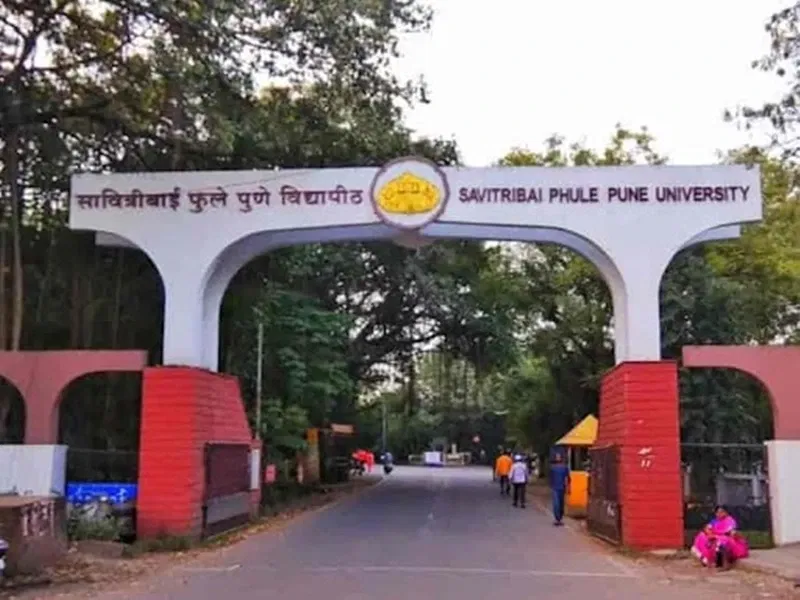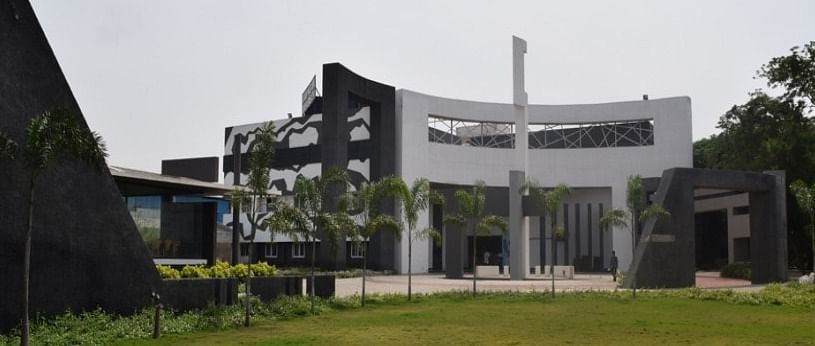MSc Virology: Course Details, Eligibility, Admission, Fees, Exams, Syllabus, Scope

MSc Virology is a two-year postgraduate biomedical programme that deals with an in-depth study of the structure, evolution, and mechanism of viruses and the prevention of different human viral diseases. MSc Virology in India focuses on research in animal virology and replication strategies of various viruses.
Table of Contents
- About M.Sc Virology
- Why Choose MSc in Virology?
- MSc Virology Eligibility
- Master of Science in Virology Admission
- MSc Virology Entrance Exams
- Top MSc Virology Colleges in India with Fees
- MSc Virology Syllabus and Subjects
- M.Sc in Virology Course Comparison
- Courses After MSc Virology
- Career Options After MSc Virology
- MSc Virology Salary in India
- Skills to Excel in MSc Virology
MSc Virology Course Details
| Degree | Masters |
| Full Form | Master of Science in Virology |
| Duration | 2 Years |
| Age | 21 years |
| Entrance Exam | MET, CUET PG, etc |
| Minimum Percentage | 50% in Bachelor's degree in science or related fields |
| Average Fees | ₹20K - 2.5 LPA |
| Similar Options of Study | MSc Microbiology and MSc Molecular Biology |
| Average Salary | INR 3-15 LPA |
| Employment Roles | Virologist, Professor, etc |
About M.Sc Virology
MSc Virology is one of the research-oriented specializations under MSc courses. The course includes the study of virus latency and tissue culture techniques. The M.Sc in Virology course is divided into 4 semesters covering subjects like Tissue Culture and Cell Biology, Virological Methods, Viral Respiratory Infections, etc.
Students can get admission for MSc in Virology if they have completed their bachelor’s degree in science or other related fields like microbiology, biochemistry, life science, biotechnology, or chemistry, with a minimum aggregate of 50% marks from a recognized university. The fees for MSc Virology range from INR 20,000 to 2.5 lakh.
The covid-19 pandemic caused due to a deadly virus, wreaked havoc across the world a few years ago. Since then, the health sector is gradually evolving with more inventions in producing vaccines to tackle any kind of virus. Research on vaccines has gained significant momentum in India. Therefore, MSc Virology jobs are plenty in the market. Virologists, Research Associates, Laboratory Assistants, etc are some promising job roles offered to students.
Why Choose MSc in Virology?
The MSc Virology course trains students in knowing virology and biochemical methods. Listed below are some reasons why a student should pursue MSc Virology in India:
- The virology market is projected to reach USD 5276.48 million by 2028. It is expected to have a CAGR of 3.8% from 2021 to 2028.
- Acute respiratory infections (ARIs) form a worldwide public health concern. It is estimated that close to 80% of cases of ARIs are caused by viruses.
- The MSc Virology course gives directional training to students on the treatment and control of various life-threatening viral infections.
- Students will develop research and critical thinking skills by knowing and providing solutions to various diseases associated with a particular virus.
Who Should Study MSc Virology?
Students passionate about researching the causes of viral infections can choose this course. The candidates will get sound knowledge of human viral diseases. The course will immensely benefit candidates who wish to serve the ever-challenging and growing health sector of India.
| Compare M.Sc in Virology with Similar Courses |
MSc Virology Eligibility
The minimum eligibility criteria for the Master of Science in Virology course differs from college to college. Elucidated below are some common eligibility requirements to get into MSc in Virology colleges in India:
- Students must have completed a bachelor’s degree in science or other related fields like microbiology or biochemistry or life science biotechnology or chemistry, with a minimum aggregate of 50% marks from a recognised college.
- The minimum age to apply for this course is 21 years.
- Candidates should clear the entrance exams like MET, SVUCET, etc conducted by the university.
Master of Science in Virology Admission
The admission process for the top MSc Virology colleges in India is through entrance exams and merit scores obtained at graduation. Explained below is the procedure followed for M.Sc Virology admission into colleges:
- Students should check for the course curriculum, fees and placement opportunities before choosing the right college.
- Candidates can either apply online through the college website or apply offline by visiting the college after admission forms are released.
- Students should upload all necessary documents carefully.
- Details on exam dates and test centers will be posted on the web portal.
- Exam results will be announced on the website.
- According to the merit list, students will be called for the counseling process.
MSc Virology Entrance Exams
The candidates get admitted for the M.Sc in Virology course by clearing the entrance exams conducted at the national or state or college level. Some of the prominent entrance tests are listed below:
A Quick Glance of Entrance Exams
Students can apply for admission into MSc Virology in India through the list of entrance exams described below.
| Exam Name | Exam Duration | Exam Pattern Link |
| CUET PG | 3 hours | CUET PG Exam Pattern |
| MET | 3 hours | MET Exam Pattern |
| DUET | 3 hours | DUET Exam Pattern |
| SVUCET | 1.5 hours | SVUCET Exam Pattern |
Also, Check: MSc Entrance Exam 2023
Top MSc Virology Colleges in India with Fees
The fees for MSc Virology range from INR 20,000 to 2.5 lakh. The fees also may change depending on the type of college or university. Listed below are the top MSc Virology colleges in India:
| Name of College | Average Tuition Fees |
| Savitribai Phule Pune University | INR 42,000 |
| Manipal University | INR 4,06,000 |
| Sri Venkateswara University | INR 23,520 |
| Amity University | INR 1,07,000 |
| Jamia Millia Islamia University | INR 1,80,000 |
| Suresh Gyan Vihar University | INR 2,06,462 |
| MGR Medical University | INR 6,000 |
| Asian Institute of Public Health | INR 1,36,000 |
| Presidency University | - |
| Jamia Hamdard | INR 90,000 |
| MGM University | - |
| ICMR-NIMS | INR 1,50,000 |
MSc Virology Syllabus and Subjects
The MSc Virology subjects have topics related to the diagnosis of viral diseases and immunology. The subjects taught in the course can differ from one college to another. Some common M.Sc in Virology core subjects are listed below:
- Basic Virology
- Tissue Culture Techniques
- Cellular Immunology
- Basic Epidemiology and Biostatistics
- Antivirals and Vaccines
- Viral Respiratory Diseases
- Molecular Biology
- Biosafety and Bioethics
- Bioinformatics
- Virus Replication
Semester-wise MSc Virology Syllabus
The syllabus under the MSc Virology course covers subjects on viral infections and cell biology. Listed below are the first and second-year syllabus for the MSc Virology course.
MSc Virology First-Year Syllabus
Listed below are first-year MSc Virology subjects:
| Semester 1 | Semester 2 |
| Basic Virology | Virus Replication |
| Tissue Culture Techniques | Recombinant DNA Technology |
| Cell Biology | Bioinformatics |
| General Microbiology | Antivirals and Vaccines |
| Basic Epidemiology & Biostatistics | Immunology II |
| Immunology I | Applied Epidemiology |
| Biological Chemistry and Analytical Techniques | Biosafety and Biosecurity |
MSc Virology First-Year Practical Subjects
Below are some practical subjects taught in the first-year M.Sc in Virology course.
- Biological Chemistry and Analytical Techniques
- General Microbiology and General Virology
- Cell Biology & Tissue Culture
- Recombinant DNA Technology and Immunology
- Biochemical/Biophysical Methods
- Practical Bioinformatics
MSc Virology Second-Year Syllabus
Listed below is a list of subjects taught in the second-year MSc Virology syllabus:
| Semester 3 | Semester 4 |
| Viral Enteric Diseases & Cancers | Animal and Human Virus Diseases |
| Viral Respiratory Diseases | Internship |
| Plant Virology | Research Project Work |
| Viral Hepatitis | - |
| Viral Haemorrhagic Fevers | - |
| Human Virology | - |
MSc Virology Second-Year Practical Subjects
Listed below are some practical subjects taught in the second-year MSc Virology course.
- Plant Virology & Virus Diseases
- Medical Lab Technology
- Animal and Human Virology & Virus Diseases and Virus-based Biotechnology
MSc Virology Subjects in Detail
The various important subjects taught in MSc Virology course are explained in detail below:
| MSc Virology Subjects | Topics Covered |
| Basic Virology | History and Principles of Virology, Virus Taxonomy, Introduction to Replication Strategies, Virus Structure and Morphology, Principles of Bio-safety, etc |
| Cell Biology and Tissue Structure | Prokaryotic and Eukaryotic Cells, Cell Cycle, Cell Signaling and Cell-Cell Interactions, Animal Tissue Culture, Plant Tissue Culture, etc |
| Immunology | Primary and Secondary Organs of the Immune System, Innate Immune Response & Inflammation, Antigen Processing and Presentation, etc |
| Basic Epidemiology and Biostatistics | Historical Aspects and Evolution of Epidemiology, Sample Size Estimation and Introduction to Study Design in Epidemiological Investigations, Introduction to Sampling Methods, etc |
| Antivirals and Viral Vaccines | Conventional Vaccines-killed and attenuated, Animal Models and Vaccine Potency Testing, Vaccine-induced Immune Response, Interferons, Designing and Screening for Antivirals, etc |
| Viral Respiratory Diseases | History, Clinical Features, Epidemiology of Influenza, RSV and other Respiratory Diseases, Biology and Pathogenesis of SARS, Differential Diagnosis of Different Respiratory Diseases, etc |
| Special Visual Effects | Compositing Principles and Pipelines, Integration with Compositing Software, Paint, Particles Creating Simple Composites Matte Paintings, Animatronics, Sets, etc |
| Molecular Biology | Genomes: types, diversity in size, structure and organization in viruses, the Modern Concept of the Genes, Gene Transfer Mechanisms and Gene Mapping in Bacteria, Types, Causes and Consequences of Mutations, etc |
| Animal and Human Virology | Virus-host Interactions, Transmission of Viruses, Factors affecting Virus Ecology and Epidemiology, Detection of Animal and Human Viruses, Prevention and Control of Viruses, etc |
M.Sc in Virology Course Comparison
Students could require more clarity when choosing similar courses related to microbiology and virology. They can look into various details of the course before making the right choice.
MSc Virology vs MSc Molecular Biology
Given below are some important differences between MSc Virology and MSc Molecular Biology
| Parameter | MSc Virology | MSc Molecular Biology |
| Type | Master’s degree | Master’s degree |
| Duration | 2 years | 2 years |
| Entrance Exam | MET, OEE, etc | MET, UOMPGEE, etc |
| Average Fees | INR 20,000 to 2.5 lakh | INR 20,000 to 2 lakh |
| Focus Area | The course focuses on concepts like diagnosis and cure of virus infections and immunology | The course provides comprehensive knowledge of concepts of clinical biochemistry, biostatistics, etc |
| Job Opportunities | Virologist, Research Associate, etc | Molecular Biologist, Pathologist, etc |
| Average Salary | INR 3-15 LPA | INR 3-10 LPA |
Read More: MSc Molecular Biology
MSc Virology vs MSc Microbiology
Given below are some important differences between MSc in Virology and MSc Microbiology.
| Parameter | MSc Virology | MSc Microbiology |
| Type | Master’s degree | Master’s degree |
| Duration | 2 years | 2 years |
| Entrance Exam | MET, OEE, etc | ICMR JRF, OUCET, etc |
| Average Fees | INR 20,000 to 2.5 lakh | INR 30,000 to 1 lakh |
| Focus Area | The course focuses on concepts like diagnosis and cure of virus infections and immunology | The course deals with functional areas of micro-organisms and behaviors of microbes such as viruses, bacteria, fungi, algae, etc |
| Job Opportunities | Virologist, Research Associate, etc | Microbiologist, Medical Writer, etc |
| Average Salary | INR 3-15 LPA | INR 4-10 LPA |
Read More: MSc Microbiology
Courses After MSc Virology
The MSc Virology scope is bright and there are several options for students to choose from after the Master of Science in Virology course. They can take up research in the same specialization or other related specializations after their master's degree. Below are some suggested courses:
- MPhil in Microbiology
- Ph.D. in Virology/Microbiology
- Online Certifications
Career Options After MSc Virology
There are several MSc Virology jobs for graduates in the field of medicine and research. Listed below are some areas that hire graduates actively.
- Pharmaceutical Companies
- Private Clinics
- Hospitals
- Research Laboratories
- Agriculture Sector
- Colleges
MSc Virology Salary in India
The average salary for the graduates of M.Sc Virology in India is INR 3-15 LPA. The income levels change according to the company, job profile, and work experience.
M.Sc Virology Salary Based on Top Companies
Listed below are some top companies that offer jobs for MSc in Virology graduates in India.
| Company | Lowest Salary (INR) | Average Salary (INR) | Highest Salary (INR) |
| National Institute of Virology Pvt Ltd | 3.3 LPA | 3.9 LPA | 4.2 LPA |
| ICMR | 5.2 LPA | 5.35 LPA | 5.5 LPA |
| Dr Reddy’s Laboratories Ltd | 2.6 LPA | 6.73 LPA | 12 LPA |
| Cipla Pharmaceutical | 4.7 LPA | 5.9 LPA | 8.1 LPA |
| Serum Institute of India | 5 LPA | 8.5 LPA | 14 LPA |
| Biocon | 6 LPA | 9.16 LPA | 14 LPA |
| Zydus Cadila | 1 LPA | 6.9 LPA | 7.4 LPA |
| Osmania Medical College | 0.68 LPA | 14 LPA | 36 LPA |
| Victoria Hospital | 0.6 LPA | 5.7 LPA | 9 LPA |
| Sun Pharmaceutical Industries | 1.7 LPA | 5.19 LPA | 9.6 LPA |
[Source: Ambition Box]
MSc Virology Salary Based on Job Designations
The average salary offered by top companies in various job profiles of MSc Virology are listed below:
| Job Designation | Average Salary (INR) |
| Virologist | 4.5 LPA |
| Laboratory Assistant | 2 LPA |
| Research Associate | 3.7LPA |
| Media Marketing Executive | 2.6 LPA |
| Assistant Professor | 5 LPA |
| Medical Scientist | 9.4 LPA |
Skills to Excel in MSc Virology
Candidates should have some essential technical and soft skills to perform well in the M.Sc in Virology course.
- Observation Skills
- Medical Knowledge
- Critical Thinking Skills
- Problem-Solving Ability
- Analytical Skills
- Research Mindset
- Patience
- Communication Skills
Top MSc Virology Colleges
Top Science Entrance Exams
MSc Virology Fee Structure
FAQs on MSc Virology
Q: What is M.Sc in Virology?
Q: What is the scope after M.Sc Virology?
Q: Who is eligible to apply for MSc Virology course?
Q: What is the fee for M.Sc in Virology?
Q: What are the subjects in MSc Virology?
Q: What is the salary offered for MSc Virology graduates?
Q: Is M.Sc Virologist a good course?
Q: What is best M.Sc Virology or Microbiology?



















